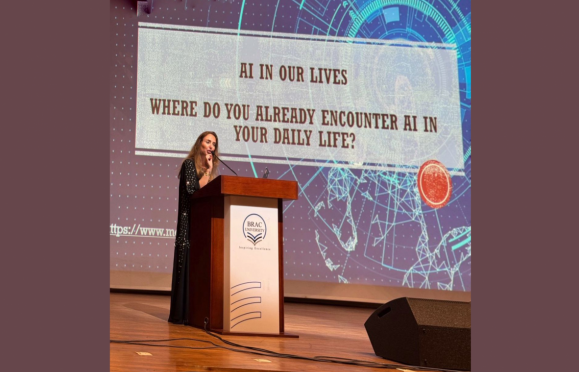BRAC Institute of Languages hosts workshop on AI in classrooms
BRAC Institute of Languages hosts workshop on AI in classrooms

BRAC University recently held a workshop titled Artificial Intelligence and Digital Tools in the Teaching of Foreign Languages: Turning a Perceived Threat into a Powerful Ally at its Merul Badda campus, shedding light on how artificial intelligence (AI) can enhance language education when used with integrity and purpose.
The session was led by Dr Noura El Sayed Rodríguez, an education and language specialist with over 15 years of experience in academic leadership, multilingual education, and digital innovation. Dr Rodríguez, who holds a PhD in multilingualism, multiculturalism, and equity studies in education from Université Saint-Joseph de Beyrouth, drew from her professional experience across the Middle East, Asia, and Africa.
Organised by the BRAC Institute of Languages, the workshop emphasised the potential of AI as a constructive force in foreign language instruction, rather than a disruptive threat. Dr Rodríguez highlighted the benefits of digital tools in the classroom, showcasing AI features such as real-time feedback, grammar and vocabulary support, writing assistance, and pronunciation practice.
She stressed the importance of normalising ethical AI use by initiating open discussions with students and encouraging critical engagement with the tools they are already using. AI, she noted, can enable personalised learning, increase access to language practice beyond class hours, incorporate gamified learning, and offer intercultural exposure—all key assets for language acquisition.
Participants included language teachers from across the country, programme coordinators, and digital learning practitioners. Together, they explored how AI could address common learning challenges, such as lack of motivation, difficulty with pronunciation, and grammar struggles. They engaged in interactive exercises to identify AI tools that could support students in these areas.
The workshop also examined pressing concerns surrounding academic integrity, particularly the difficulty of detecting AI use in student work. This underscored the need for clearer institutional guidelines and informed teaching practices to ensure transparency and accountability.
Through discussions on common myths versus the realities of AI, the workshop encouraged a more grounded and nuanced understanding of the technology. It aimed to equip educators with the mindset and skills needed to thoughtfully integrate AI into their pedagogical strategies.
In her closing remarks, Dr Rodríguez urged educators to take an active interest in the AI tools their students favour. Understanding students’ digital habits can help teachers incorporate relevant technologies into their instruction, making learning more effective and contextually meaningful. This, she added, would foster responsible and ethical AI use, aligned with the evolving dynamics of modern classrooms.


